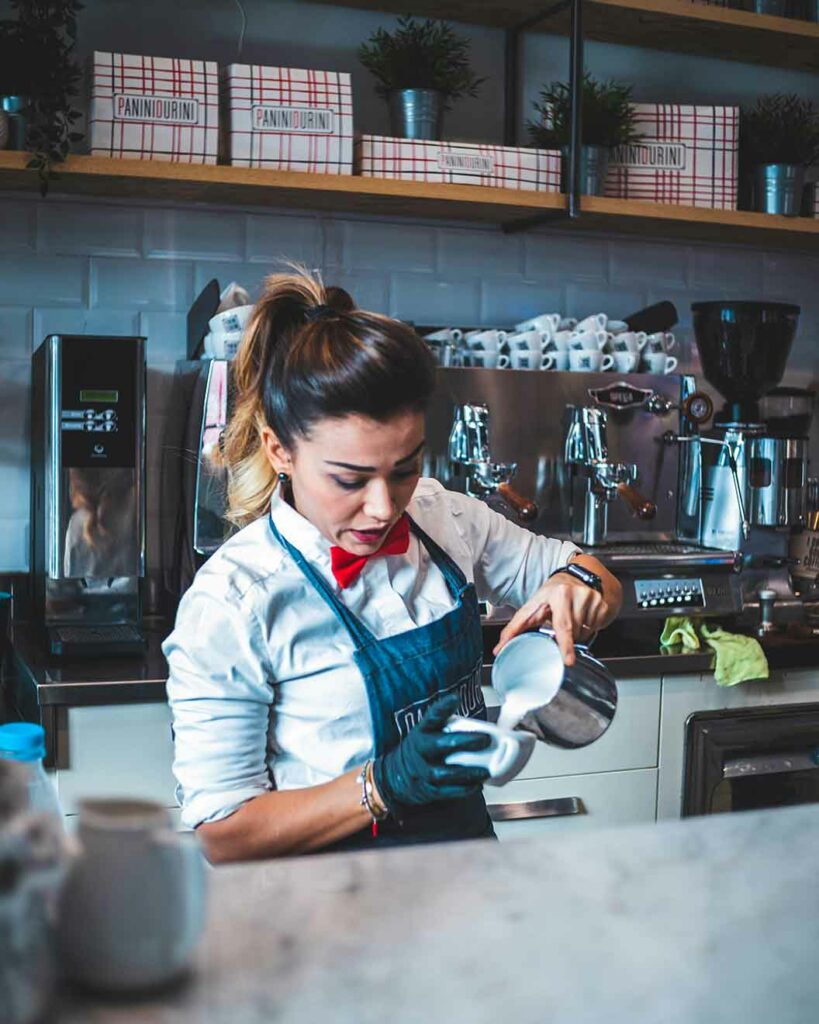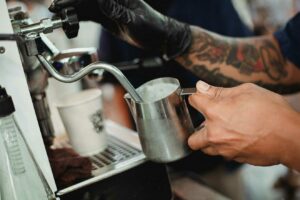Leases, licenses, location, labour costs, legalities… Buying an eatery can feel overwhelming. Fortunately for you, CoGoGo has it all covered with this checklist for buying your first café.

Look at the fine print
How much is the rent and how long is left on the lease?
Most cafés are sold on a leasehold basis, so it’s crucial to ensure that a reasonable amount of time remains on the lease.
Note: if the purchase price is primarily for the trade and goodwill, you’re going to want more than 5 years remaining on the lease, especially if you’re paying a large amount of cash upfront.
You’ll also want to discuss the possibility of rent renegotiation with the current owner, or directly with the landlord. If you renegotiate the rent based on turnover, it’ll be more flexible. The general consensus is to keep your rent costs under 10%-15% of your turnover.

Brewing up profits
What’s the café’s yearly turnover and profit margins, and what normalised earnings can you expect to take?
You’ll want to dig into the café’s financials and look at how this compares to the industry average.
What sales is the café making in an average year? According to business sales platform Bizdaq, the average coffee shop turnover sits between £100,000 and £150,000, with 22% of all cafes and coffee shops achieving this.
Look at the gross profit margin (or sales minus cost of goods): according to St Martin’s Coffee Roasters, a healthy gross margin for cafes should sit at around 75%. There are also specific VAT rules in place for catering that’ll you need to account for, so make sure you factor them in where applicable.
Look at the other overheads detailed in the accounts: Sage recommends that staff costs should represent under 30% of sales, and rent under 15%. If either goes above this, you’ll want to think whether there’s scope to cut costs or boost revenue.
Finally, you’ll want to look at what you can expect to take home at the end of the month in profits. You might need to make adjustments, removing any non-recurring or unusual expenses or owner-related expenses, to get an adjusted earnings figure.

Sprawling charm or elbow farm
What’s the square footage?
If you’re dreaming of a café cash cow, you’ll want to ensure that the space can accommodate a reasonable number of covers. If you’re simply wanting a lifestyle business, a small number of covers may suffice.
If you fall in love with the café, but it doesn’t necessarily support your money-making aspirations, you may wish to consider combining it with another catering proposition – such as sandwich delivery or setting up stalls at markets and other community events.

Location, location, location
Is the café in a high-footfall area?
One of the main principles of successful retail also apply to cafés: being located in a high-traffic area with a visible storefront.
However, unlike retail stores, a café doesn’t necessarily need to be on the high street. Don’t overlook cafés for sale in areas like public parks, bus terminals, train stations, or even business and industrial parks—these can be great locations for a café.
If your café is not directly on the main path of pedestrian traffic—such as being tucked away on a side street or around the corner from a station—you’ll need to think in advance of strategies to make sure customers can find you easily.

Licence to sell
Does the café have all the necessary licenses and permissions?
Ask the current owner what licences and permissions the establishment already has. When taking ownership, you’ll need to ensure full legal compliance and secure all necessary licenses. In the UK, this includes A3 registration, which authorises premises for “the sale of food or drink for consumption on-site or hot food for off-site consumption.”
If you plan to enhance the atmosphere with music, you’ll likely need a music license. Additionally, if you intend to place tables, chairs, or other furniture on the pavement, some local governments will require a pavement license.
If you do plan to venture into the realm of alcohol sales (hello Coffee Negroni), you’ll need two licences – one for your business premises (premises licence) and one for you or your bar manager (personal licence).
You may also wish to ask the current owner which insurance providers they currently use, because you’ll most likely require employer liability insurance, public liability insurance, and commercial property insurance.

Beans, machines, and caffeine dreams
What are the quality of the assets that you’ll be inheriting?
Nobody wants to splurge on their first café to discover that the £5k-espresso machine has given up the ghost and the commercial dishwasher needs to be repaired.
Determine whether the equipment is under a finance agreement or owned outright. If financed, what are the terms of the agreement (e.g., loan duration, interest rate, monthly payments)? Are there any remaining balances or payments to be made before the item can be fully owned?
You’ll also want to ask how old the assets are and whether they have received regular servicing and maintenance.
Start your Cafe Business Journey with us
Steaming ahead
What are the prospects for growth?
If part of the café’s value proposition includes growth potential, consider how practical it’ll be to achieve this.
Within reason, your café’s costs will be pretty much fixed. This means that the onus will be on boosting customer numbers and increasing average receipts.
Think about ways that this might be achieved. It might mean selling higher-margin products such as low-prep plates and desserts you can make cheaply in-house such as ice-cream and cakes. It might mean incentivising staff to upsell, cross-sell and offer refills on a more regular basis. It might also mean revamping the café’s digital presence and investing in targeted social media marketing.
You could even consider getting the café on Uber Eats, Deliveroo, or other third-party platforms, which will open you up to a wider radius of people.

Money, money, money (must be funny…)
How are you going to fund your purchase?
Time to look inwards. Are your own finances in order? How do you plan to finance the café purchase?
Do you have a deposit to put down, and will you be able to secure a loan for the remainder of the purchase price? Note that most loans will require a deposit (security) from the borrower. This may be provided as a cash input, or in the form of collateral, such as property and hard assets. The deposit sum will vary depending on the type of loan provided and your financial situation.
It may be helpful to speak to a finance broker who’ll be able to formulate a competitive proposal for lenders on your behalf.

All the legal stuff (yawn)
Do you have a robust Sale & Purchase Agreement (SPA)?
A robust Sale & Purchase Agreement is essential to protect you from any undisclosed issues that could arise after the sale.
You’ll need a solicitor to ensure that the right warranties and indemnities are included to protect your investment. It is essential you understand what you’re agreeing to, particularly in relation to the lease obligations (for example, repairing obligations).


